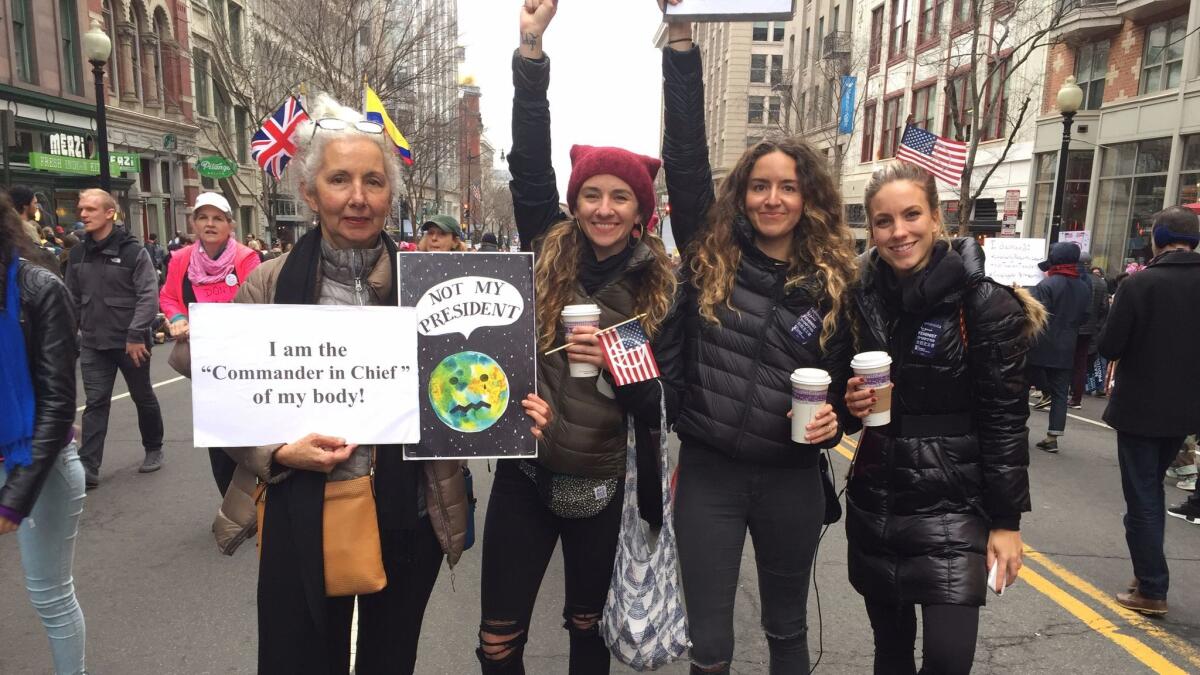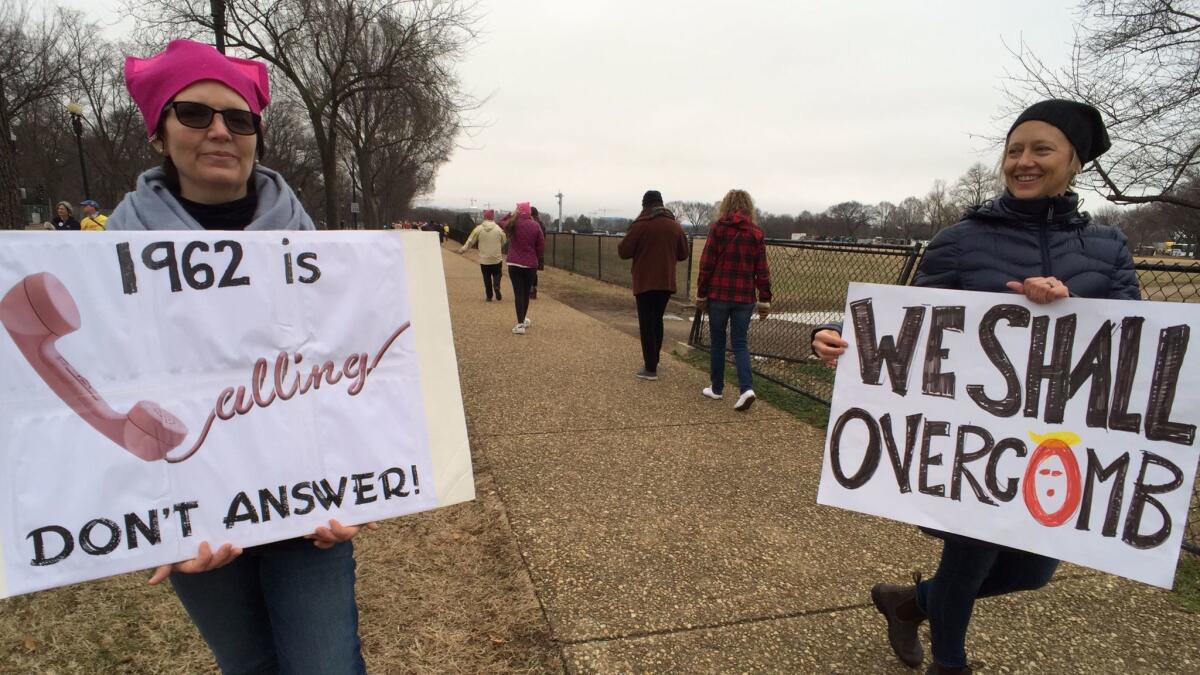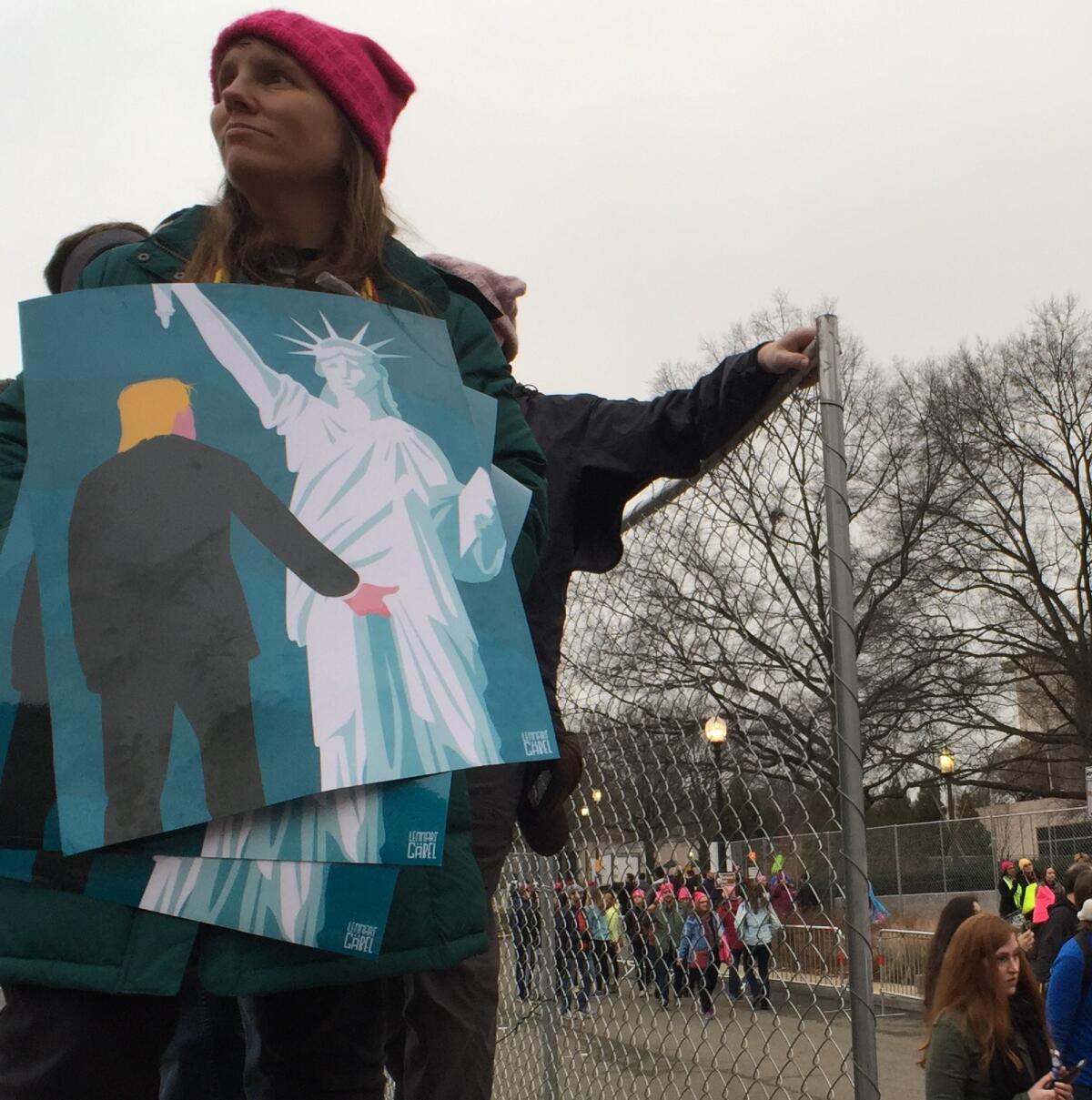California Journal: Those pink hats, that vulgar word: Now a rallying cry against President Trump

Who could have guessed that a vulgar, sexist conversation between a future president and an entertainment journalist would not just normalize a word that has always made us cringe, but provide a rallying cry for a reinvigorated feminist movement?
On Saturday morning, as I came out of the Metro near the Verizon Center in Washington, and saw a sea of pink âpussy hatsâ stretching forever, I realized that President Trumpâs infamous vulgarity has not just been co-opted by his opponents, but weaponized in the fight against his campaign promises and policies.
The mass demonstrations around the country and the globe on the day after Trump was inaugurated were about several things: his stance on abortion and reproductive rights (an overwhelming theme of protest signs); religious and racial discrimination; and climate change.
These fears are not unfounded. Already, Trump is turning back the clock on reproductive rights. Tuesday, he reinstated a Republican Party favorite, the âglobal gag rule,â which denies foreign aid to organizations that provide abortions or even discuss the procedure as a healthcare option. He and his congressional allies support defunding Planned Parenthood, which provided healthcare to nearly a million mostly low-income Californians last year.
Despite the gravity of these issues, protesters shared a kind of lightness, accomplished with a sly humor that seems almost entirely lacking in our new chief executive.

Melania Trump turned up twice wearing outfits with what is called a pussy bow, and fasion sleuths mused that perhaps it was a calculated nose-thumb to critics. (Jan. 20, 2017)
People were exuberant, energized and funny: âWe need a leader, not a creepy tweeterâ was an oft-heard chant on Constitution Avenue, as crowds of demonstrators streamed past the south side of the White House. â1962 is calling,â read one of my favorite protest signs. âDonât answer!â
The once-verboten word was everywhere, spelled out or implied. One wordless poster, by German illustrator Lennart Gabel, showed Trump grabbing the Statue of Liberty by the crotch, which is what he told âAccess Hollywoodâsâ Billy Bush in 2005 that he does to women.
The new ubiquity of this word is a measure of how fast standards are changing in the era of Trump.
Womenâs body parts â and their names â have always been the subject of prurience, squeamishness and shame.

On Saturday night, I watched a performance of Lisa Loomerâs new play, âRoeâ at the Arena Stage in Washington. Its two main characters are Sarah Weddington, the young attorney who argued the Roe v. Wade case before the Supreme Court, and her client, Norma McCorvey.
An early scene set in the late 1960s features women, with speculums and mirrors, trying to find their cervices, in the style of âOur Bodies, Ourselves,â the breakthrough self-help book.
The consciousness raising has never really stopped.
In 2000, I was standing on a sidewalk in Los Angeles outside Campanile restaurant, waiting for my car. I was on my way to see a controversial play with a group of women. An older couple standing next to us casually asked what we were seeing.
I remember stammering and blushing as I coughed up, âThe Vagina Monologues.â
They laughed nervously and turned away.
More than a decade later, I remember not being able to comfortably say âPussy Riotâ aloud when members of the Russian artsâ collective were being persecuted by their government. Now, that discomfort seems quaint.
Still, for many women, the p-word does not easily pass the lips.
âI donât feel comfortable using it,â said Cecilia Crocker, a 63-year-old Colombia-born San Franciscan, who marched in Washington with her daughters, Stephanie and Samantha. âI am not a prude, and I use a lot of words that are not ladylike, but this is a word Donald Trump would use, not me.â

Likewise, her 31-year-old daughter, Stephanie Crocker, a San Francisco prop stylist, said âitâs not a word I would have thrown around before.â But she was struck during the campaign by a much-viewed exchange between Republican strategist Ana Navarro, a vocal Trump opponent, who repeatedly used the word, and Scottie Nell Hughes, a Trump supporter.
âWill you please stop saying that word,â Hughes told Navarro. âMy daughter is listening.â
âDonât tell me youâre offended when I say [it],â snapped Navarro, âbut youâre not offended when Donald Trump says it. That is just absurd.â
It is exactly this kind of hypocrisy that gave rise to the pink hats and the in-your-face display of a word that is not ordinarily used in polite company.
But civility in our public discourse is a thing of the past.
Women have embraced their nasty side. And we have no one but Trump to thank for that.
Twitter: @AbcarianLAT
ALSO
Shaded pink, womenâs protest fills the streets of downtown L.A.
Metro ridership surged the day of the womenâs march in downtown L.A.
Californiaâs stormy winter sets snowfall record for Mammoth resorts â over 20 feet in one month
More to Read
Sign up for Essential California
The most important California stories and recommendations in your inbox every morning.
You may occasionally receive promotional content from the Los Angeles Times.











